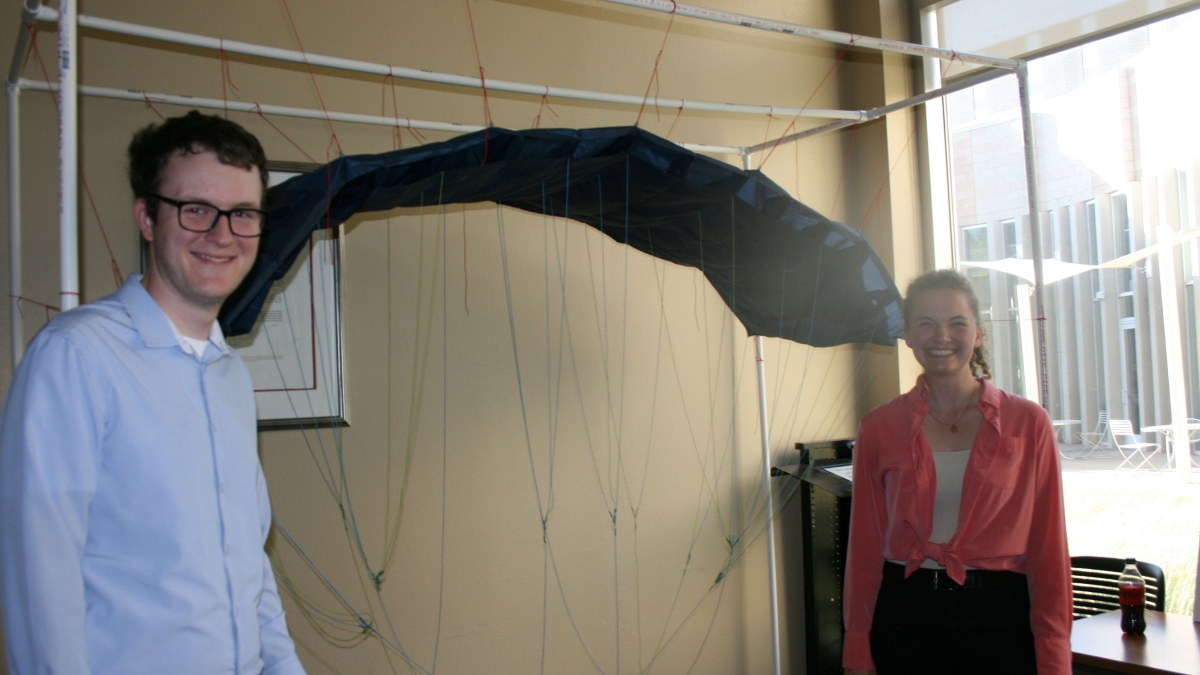Honors students showcase undergraduate research at ASU symposium

Barrett Honors College students Lukas Severinghaus and Audrey Schlichting display the parafoil they designed and built for their honors thesis at the 22nd annual Celebrating Honors Symposium.
It took more than 40 hours to laser cut fabric and sew it together to make the parafoil that is the centerpiece of the project titled “Manna: An Autonomously Guided Parachute Delivery System” that Arizona State University students Audrey Schlichting and Lukas Severinghaus collaborated on for their honors thesis.
Schlichting, a senior majoring in mechanical engineering systems and professional flight who is also a certified pilot, and Severinghaus, a junior majoring in robotics – both at the Polytechnic campus – combined their interests and knowledge to create an automated, low-cost, safe airdrop system consisting of a parafoil and guidance unit.
The pair of students in Barrett, The Honors College presented their project at the 22nd annual Celebrating Honors Thesis Symposium held last week on the Tempe campus. Theirs was one of more than 100 projects presented by honors students from all four campuses across 10 colleges in addition to Barrett, including the W. P. Carey School of Business, Herberger Institute for Design and the Arts, Ira A. Fulton Schools of Engineering, College of Health Solutions, Walter Cronkite School of Journalism and Mass Communication, New College of Interdisciplinary Arts and Sciences, College of Integrative Sciences and Arts, The College of Liberal Arts and Sciences, Mary Lou Fulton Teachers College and the School of Sustainability. Eighty faculty members from througout ASU served as thesis directors.
Schlichting explained that traditional airdrops of food, supplies or medicine, for example, are often done by pilots tossing packages out of plane windows or open compartments while flying over places that cannot be easily reached by ground. She and Severinghaus set out to create an alternative delivery method that would employ a less risky, more accurate, steerable and more affordable system using a parafoil and drone.
In addition to custom designing and making a parafoil and guidance unit, the pair conducted many test flights, completed an 89-page paper documenting their research, methods and outcomes, and made a poster and slide presentation.
“With my experience in flying and his in robotics, we were able to bring our vision to life,” Schlichting said.
Severinghaus agreed. “We come from two very different fields, but each of us brought our own knowledge to the project. This is a really good cross-disciplinary collaboration,” he said.
The duo plans to continue refining their autonomous delivery system. They have been invited to work with an international organization to determine how their system could be used for humanitarian missions.
Severinghaus and Schlichting are a great example of what the Barrett undergraduate experience and symposium are all about.
“Our Celebrating Honors Symposium every spring allows us to showcase innovative undergraduate research in the advancement of scholarship and community impact across multiple disciplines,” said Kristen Hermann, Barrett vice dean.
“These intellectually rigorous projects can be in the student’s major, but students often choose to study projects outside the major as well, given their multiple talents and the interdisciplinary nature of Barrett. The thesis experience and process also prepares students to publish or get a leg up on the graduate school or job interview process,” she added.
Jasmine Lopez, a biology and global health major with a Spanish minor, brought her disciplines together for a project titled “Salud Empoderada: Bilingual Pre-Health English-Spanish Blog.”
“I was able to combine all of my interests and passions, including science, health care and the Spanish language into this thesis,” Lopez said.
Lopez said she created the blog to address the lack of Latino representation in medical schools and scientific doctoral programs and increase high school and college students’ exposure to careers in medicine and science. Blog posts, infographics and interviews with professionals in these fields are featured on Salud Empoderada.
Jude Kolodisner, a senior majoring in biomedical sciences, analyzed social isolation in animals and humans, finding that both share similar biological responses.
Kolodisner, who plans to attend medical school, said his research project, titled “Comparing Human and Non-Human Animal Social Isolation,” has implications for spotting and understanding symptoms of social isolation, such as stress and depression, and determining effective interventions.
Anika Islam, a senior business health care major, examined social curiosity — an interest in acquiring new information about how other people think, behave and feel — among young children.
This psychology-based project titled “The Malleability of Social Curiosity in Early Development” involved a study of 5- to 8-year-old children and surveys of their caregivers.
“I was able to be a part of the process of creating a whole research study as an undergraduate. If I wasn’t a part of Barrett, I would not have had this experience. It was a fun and creative experience that I’m grateful for,” said Islam, who will graduate in May and work in Phoenix as a health care analyst for consulting company Cognizant.
After a couple hours of students presenting their research in many formats, including posters, made objects and online, the event closed with a reception honoring the students and their thesis directors from multiple disciplines throughout ASU.

